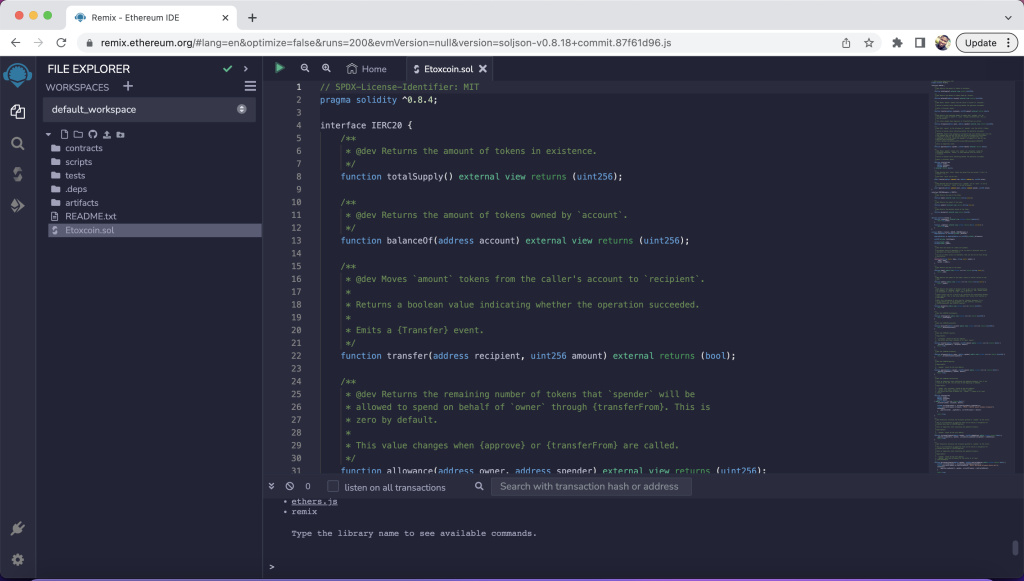Last Updated on April 19, 2023

Solidity is a programming language designed specifically for the development of smart contracts on the Ethereum blockchain.
At its core, blockchain is a decentralized, immutable, and transparent ledger that can be used to record transactions and other forms of data. One of the most exciting applications of blockchain technology is smart contracts, which are computer programs that execute automatically when certain conditions are met.
Smart contracts have the potential to streamline a wide range of business processes, from supply chain management to financial transactions.
Solidity allows developers to write code that can be executed on the Ethereum Virtual Machine (EVM), which is a decentralized computing platform that runs on top of the Ethereum blockchain.

What is Solidity?
Solidity is an object-oriented programming language that is similar to C++, Python, and JavaScript. It was developed by the Ethereum Foundation and released in 2014. It is designed to be easy to learn and use, while also being powerful enough to handle complex smart contract applications.
Solidity is a statically-typed language, which means that variable types must be explicitly defined in the code. This helps to prevent errors and makes the code easier to read and understand. It also supports inheritance, which allows developers to create complex contracts by building on existing code.
It has evolved over time as the Ethereum blockchain has grown and evolved. New features and functionality have been added to it to make it more flexible and powerful. Solidity has become one of the most widely used programming languages in blockchain development.
Related: Who is a Blockchain Developer?
How Solidity Works
Solidity is used to write smart contracts that can be executed on the Ethereum Virtual Machine. Smart contracts are computer programs that run on the blockchain and can be used to enforce the terms of an agreement between parties.
They are self-executing, which means that they automatically execute when certain conditions are met.
Solidity contracts are written in a text editor and saved as .sol files. The Solidity compiler is used to convert the code into bytecode, which can be executed on the Ethereum Virtual Machine. The bytecode is then deployed to the Ethereum blockchain, where it can be executed by the EVM.
These contracts are made up of functions, which are similar to methods in other programming languages. Functions can be called by other functions within the same contract, or they can be called by external contracts.
Solidity also supports events, which are used to notify external contracts when certain conditions are met.
One of the key features of Solidity is its support for modularity. Solidity contracts can be broken down into smaller, reusable components called libraries.
Libraries can be used to add functionality to multiple contracts without having to rewrite the same code multiple times.
Solidity also supports inheritance, which allows developers to create complex contracts by building on existing code.
Inheritance is used to create contracts that inherit properties and methods from other contracts. This helps to reduce code duplication and makes contracts easier to maintain.
Examples of Solidity Applications
Solidity has a wide range of applications in blockchain development. Some of the most popular use cases include decentralized finance, supply chain management, and identity verification.
Decentralized Finance (DeFi)
Decentralized finance (DeFi) is one of the most exciting areas of blockchain development. DeFi applications are designed to provide financial services using blockchain technology, without the need for intermediaries such as banks.
Solidity is used to develop smart contracts that power DeFi applications such as decentralized exchanges, lending platforms, and stablecoins.
One example of a DeFi application built using Solidity is Uniswap, which is a decentralized exchange that allows users to trade cryptocurrencies without the need for a centralized exchange.
Uniswap uses Solidity contracts to manage the exchange of tokens between buyers and sellers.
Supply Chain Management
The blockchain can be used to track the movement of goods from one location to another, providing transparency and accountability throughout the supply chain.
Solidity contracts can be used to enforce the terms of agreements between parties, such as the delivery of goods at a certain time and place.
An example is Provenance, which is a blockchain-based platform that tracks the movement of goods from farm to store.
Provenance uses Solidity contracts to manage the transfer of ownership of goods from one party to another, ensuring that the terms of the agreement are met.
Identity Verification Applications
The blockchain can be used to store and verify personal identity information, such as passports and driver’s licenses. Solidity contracts can be used to ensure that only authorized parties have access to this information and that it is only used for the intended purpose.
One example is uPort, which is a blockchain-based identity system that allows users to create and manage their own digital identities. uPort uses Solidity contracts to store identity information on the blockchain and to ensure that only authorized parties can access this information.
Solidity Development Tools
Developing Solidity contracts requires specialized tools and platforms. There are several popular Solidity development tools available, including Remix and Truffle.
Remix is a web-based development environment that allows developers to write, test, and deploy Solidity contracts. Remix includes a compiler, a debugger, and a testing framework, making it a comprehensive development environment for Solidity.
Truffle is another popular Solidity development tool that provides a suite of tools for developing and testing Solidity contracts. Truffle includes a development environment, a testing framework, and a deployment tool, making it a powerful tool.
When developing these contracts, it is important to follow best practices to ensure that the code is secure and reliable. This includes writing tests to ensure that the code works as expected, using secure coding practices to prevent vulnerabilities, and performing regular code reviews to catch errors and bugs.
The Limitations
Solidity is one of the most widely used programming languages in blockchain development, but it is not without its limitations.
Scalability of the Ethereum Blockchain
One of its biggest challenges is the scalability of the Ethereum blockchain.
As more users and applications use the Ethereum blockchain, the network can become congested, leading to slow transaction times and high fees.
To address these scalability issues, the Ethereum Foundation is working on Ethereum 2.0, which is a major upgrade to the Ethereum blockchain. Ethereum 2.0 will introduce several new features, including sharding, which will allow the network to process more transactions in parallel, and proof-of-stake, which will reduce the amount of energy required to validate transactions.
Alternative Smart Contract Languages
While Solidity is currently the most widely used language for developing smart contracts on the Ethereum blockchain, there are several other languages, such as Vyper and Rust, that are gaining popularity. These languages offer different features and functionality that may be more suitable for certain applications.
Despite these challenges, Solidity is likely to remain a key programming language in blockchain development for the foreseeable future.
The Ethereum ecosystem is rapidly evolving, with new tools and platforms being developed to support Solidity development. For example, the OpenZeppelin project provides a library of secure and tested smart contracts. The library can be used as a building block for developing new applications.
Conclusion
Solidity is a programming language used to develop smart contracts on the Ethereum blockchain. It allows developers to create self-executing contracts that can automate complex business logic and eliminate the need for intermediaries in financial transactions.
Solidity has numerous use cases, including decentralized finance, supply chain management, and identity verification. Its development requires specialized tools and best practices to ensure that the code is secure and reliable.
While it faces challenges related to scalability and competition from alternative smart contract languages, it is likely to remain a key programming language in blockchain development. As the blockchain ecosystem continues to evolve, there will be a continued need for developers with expertise in Solidity and other smart contract languages.
Before you go…
Hey, thank you for reading this blog to the end. I hope it was helpful. Let me tell you a little bit about Nicholas Idoko Technologies. We help businesses and companies build an online presence by developing web, mobile, desktop, and blockchain applications.
We also help aspiring software developers and programmers learn the skills they need to have a successful career. Take your first step to become a programming boss by joining our Learn To Code academy today!
Be sure to contact us if you need more information or have any questions! We are readily available.











